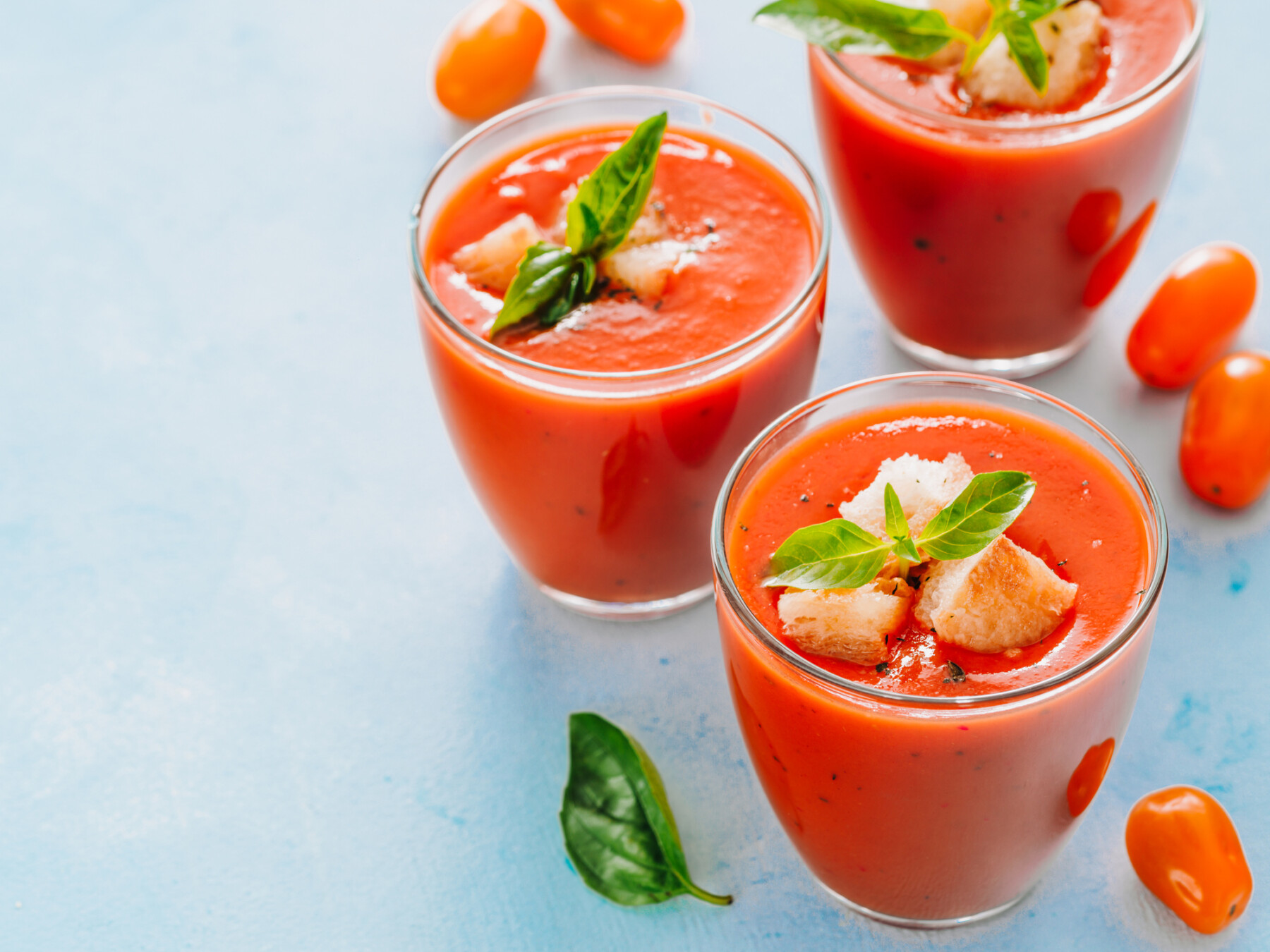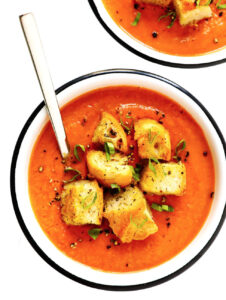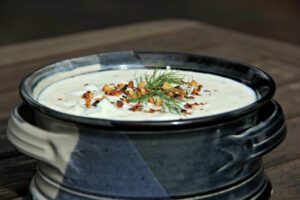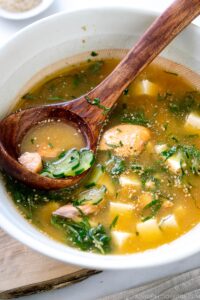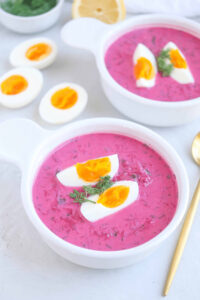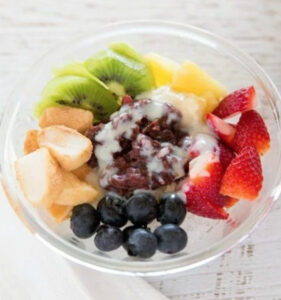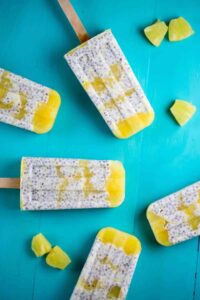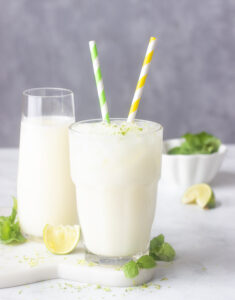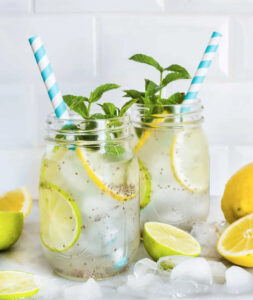By: Ola Pabjas, Registered Dietitian, Reviewed and Edited by JM Nutrition Team
In this post:
- What is dehydration?
- Side effects of dehydration
- The role of electrolytes
- Sports drinks and hydration
- Cold hydrating foods for summer recipes
What are some cold hydrating foods for the summer? Before we list recipes of foods that hydrate, it’s important to examine hydration and dehydration in some detail.
Dehydration
In the summer, we tend to sweat more due to the combination of hot weather and increased physical activity. When we sweat, we not only lose fluids but we also lose important substances called electrolytes. So there’s more to it than just drinking water alone, especially when we sweat a great deal. But what exactly are electrolytes, and why do they matter?
What are electrolytes?
Electrolytes are minerals such as sodium, potassium, chloride, calcium and magnesium. Some minerals have positive electrical charges, while others carry negative ones. These electrical charges dissolved in fluid help regulate fluid balance, nerve impulses, muscle contractions and maintain proper pH levels in our blood. Our heart, kidneys, and brains cannot work without these functions.
Discover more about electrolytes.
The side effects of dehydration
Not drinking enough water can lead to various complications, even if the dehydration is mild.
You may experience headaches, dizziness, and difficulties with memory, concentration and digestion.
Learn more about the symptoms of dehydration.
It can also affect your mood. In addition, not staying properly hydrated puts us at risk of developing heat stroke, kidney stones, urinary tract infections, and constipation.
Therefore, to keep our body working well during the summer, it’s important to replenish electrolytes and fluids. You can easily do so by turning to cold hydrating foods for the summer, which we will address a little later in the post.
Learn more about the importance of drinking water.
Are sports drinks good for hydration?
Many of us know sports drinks contain electrolytes, but they also usually contain sugar. That’s because sports drinks are designed for athletes and the sugar serves a specific purpose. According to our sports nutritionists, the sugar in sports drinks replenishes the sugar that athletes deplete from their blood during intense, prolonged exercise, providing the necessary fuel for them to keep going strong.
When not performing intense, prolonged activity, sports drinks may not be appropriate for the average person because they can contribute “free” sugars to our diet. “Free” sugars are natural sugars removed from their original food and added to other foods as a sweetener or preservative. This includes sugars naturally present in honey, syrups, fruit juices and fruit juice concentrates.
“Free” sugars differ from “intrinsic” sugars in whole fresh fruits, vegetables, dairy and grains. Unlike “free” sugar, “intrinsic” sugar comes packaged with other nutrients like fibre, fat, and protein, which causes it to be digested more slowly, taking longer to enter the bloodstream. The more time it takes sugar to enter the blood, the slower blood sugars rise, preventing unhealthy glucose spikes and unpleasant energy crashes.
“Free” sugars guidelines
To reduce risk of metabolic diseases, recommendations are to not exceed 50 grams of “free” sugars a day.
As an example, a 20-ounce (591-ml) bottle of Gatorade contains 34 grams of “free” sugar. This doesn’t leave much room for other “free” sugars we may eat the rest of the day. There are sugar-free sports drinks, but perhaps you’re trying to avoid artificial sweeteners and looking for a way to hydrate that comes with the bonus of promoting health and energy and decreasing inflammation.
Related: Sugar 101
Can you eat hydrating foods instead?
A great alternative to hydrating with plain water and sports drinks is hydrating through nutrient-dense foods and beverages. These foods contain fluids and electrolytes. In addition, their “intrinsic” sugars come packaged with healthy fats, proteins, fibre, and several beneficial vitamins and antioxidants.
So as the scorching sun embraces us during the warmer season, let’s keep our bodies cool, hydrated and nourished. What better way to do so than eating some delicious, cold hydrating foods for the summer.
Cold Hydrating Foods For The Summer Recipes
1. Spanish Gazpacho
-
Photo and recipe courtesy of www.gimmesomeoven.com
Description
No hydrating foods recipes list would be complete without gazpacho. Packed with juicy tomatoes, crisp cucumbers, vibrant peppers, and aromatic herbs, gazpacho is a hydrating powerhouse. As such, it should be a cold hydrating foods for the summer staple.
Serve chilled in a bowl or mug, garnished with your desired toppings or over ice in glasses with a straw.
Details:
- Fluid: juicy vegetables
- Electrolytes: sodium, potassium, chloride, magnesium
- Vitamins and Anti-Inflammatory Compounds: lycopene, beta-carotene, Vitamin C and E
- Fibre: due to blending the whole foods
2. Bulgarian Tarator (Cucumber Yogurt Soup)
-
Photo and recipe courtesy of compassandfork.com
Description
If you like tzatziki, you’ll no doubt love Tarator. Tarator is a cooling, refreshing soup traditionally enjoyed in Bulgaria. Packed with cooling yogurt, crisp cucumbers, and buttery walnuts, it’s a deliciously refreshing meal.
Serve chilled in a bowl, garnished with fresh dill and roasted walnuts.
Details:
- Fluid: yogurt, water, cucumber
- Electrolytes: sodium, calcium, potassium
- Protein: yogurt
- Vitamins and Anti-Inflammatory Compounds: Vitamin E, D and B, flavonoids, polyunsaturated fats
3. Japanese Hiyajiru (Chilled Miso Soup)
-
Photo and recipe curtesy of www.justonecookbook.com
Description
This chilled miso is a deeply flavourful, satisfying soup made with fresh, seasonal vegetables and sesame. As a result, it’s an ideal cold hydrating food for the summer.
As a fermented food, miso paste brings umami and a healthy dose of probiotics to promote gut health.
Details:
- Fluid: water, cucumber
- Electrolytes: sodium, calcium, magnesium, potassium, chloride
- Protein: tofu
- Vitamins and Anti-Inflammatory Compounds: Vitamin B, E and A, isoflavones
- Probiotics: miso
4. Polish Chłodnik (Cold Beet Soup)
-
Photo and recipe courtesy of www.whollytasteful.com
Description
A hydrating food staple in Poland, this traditional soup has a fantastic magenta colour and a healthy dose of probiotics from kefir. It’s cooling and light, but will keep you satiated for hours, so you can get back to enjoying the beautiful weather. Make this delicious and hydrating food a staple this summer.
Details:
- Fluid: water, kefir
- Electrolytes: sodium, calcium, potassium, magnesium
- Protein: eggs, yogurt
- Vitamins and Anti-Inflammatory Compounds: Vitamin D, B, A and C, betalains
- Probiotics: kefir
5. Patbingsu (Shaved Ice with Sweet Red Beans and Fruit)
-
Photo and recipe courtesy of mykoreankitchen.com
Description
Undoubtedly, Patbingsu is one of the most popular summer desserts in Korea. It not only satisfies your sweet tooth, but also leaves you with sustained energy to get you through the fatigue that comes along with hot summer days. Hydrating foods do not get much better than this.
Details:
- Fluid: shaved/crushed ice
- Electrolytes: calcium, potassium, magnesium
- Protein: beans
- Vitamins and Anti-Inflammatory Compounds: Vitamin C, anthocyanins, lutein, flavonoids
- Fibre: beans, fresh fruit
6. Pineapple Chia Seeds Popsicles
-
Photo and recipe courtesy of www.jessicagavin.com
Description
This is chia pudding’s cousin visiting for the summer from abroad. These popsicles have both, a pleasant creamy texture and satisfying crunch. Consequently, they’ll quench your craving for a cold sweet treat to beat the heat without spiking your blood sugars.
Details:
- Fluid: coconut milk
- Electrolytes: calcium, potassium, magnesium
- Vitamins and Anti-Inflammatory Compounds: Vitamin C and E, flavonoids, polyphenols, bromelain, polyunsaturated fats
- Fibre: chia seeds, pineapple
7. Limonada Suíça (Brazilian Limeade)
-
Photo and recipe courtesy of whiskitrealgud.com
Description
A dreamy tangy drink rounded out with fibre and fat to buffer any spikes in blood sugar. It’s best to drink it the same day or it will become too bitter the next day.
Details:
- Fluid: water, limes
- Electrolytes: calcium, potassium, magnesium
- Vitamins and Anti-Inflammatory Compounds: Vitamin C, flavonoids, limonoids, kaempferol, quercetin
- Fibre: due to blending the whole limes
8. Agua Fresca con Chia (Mexican Fruit Water with Chia)
-
Photo and recipe courtesy of www.maricruzavalos.com
Description
Chia seeds give this cool refreshing drink a unique texture, gut-friendly soluble fibre and brain friendly fats. This version is a simple lemonade, but agua fresca can be made with any fruit (and even some vegetables).
Details:
- Fluid: water, juice fruit and vegetables
- Electrolytes: potassium, magnesium, calcium
- Vitamins and Anti-Inflammatory Compounds: Vitamin C, beta-carotene, lycopene, lutein, and polyunsaturated fats
- Fibre: chia seeds, and from any blended whole fruit/vegetables
Related: Summer Nutrition Tips
Conclusion
There you have it: you can now enjoy the hot weather with these refreshing, delicious, cold hydrating foods for the summer recipes (and drinks too). As always, if you have a hydrating food or drink recipe that you feel should be on the list, by all means, let us know. We welcome user-generated content.
Furthermore, for personalized nutritional counselling or nutrition coaching, recipe revamps and other nutrition matters with an on-site or online dietitian, book a free consultation or contact us for an appointment.
References
1. Lobo, D. N. (2004). Fluid, electrolytes and nutrition: physiological and clinical aspects. Proceedings of the Nutrition Society, 63(3), 453-466.
2. Valtin, H. (2002). “Drink at least eight glasses of water a day.” Really? Is there scientific evidence for “8× 8”?. American Journal of Physiology-Regulatory, Integrative and Comparative Physiology.
3. Maughan, R. J. (1998). The sports drink as a functional food: formulations for successful performance. Proceedings of the Nutrition Society, 57(1), 15-23.
4. Guideline: sugars intake for adults and children. (2015). (publication). World Health Organization – Nutrition and Food Safety Team. Retrieved June 28, 2023, from https://www.who.int/publications/i/item/9789241549028.
5. Erion, K. A., & Corkey, B. E. (2017). Hyperinsulinemia: a cause of obesity?. Current obesity reports, 6, 178-186.
6. Lemon-Lime Powder. Gatorade Canada. (2020, August 8). https://gatorade.ca/collections/sport-drinks/products/lemon-lime-powder-12pk
7. Sommerfield, A. J., Deary, I. J., & Frier, B. M. (2004). Acute hyperglycemia alters mood state and impairs cognitive performance in people with type 2 diabetes. Diabetes care, 27(10), 2335-2340.
8. Kempton, M. J., Ettinger, U., Foster, R., Williams, S. C., Calvert, G. A., Hampshire, A., … & Smith, M. S. (2011). Dehydration affects brain structure and function in healthy adolescents. Human brain mapping, 32(1), 71-79.
Other Popular Posts:
Nutrition and Stress Management
About Author
Ola Pabjas is a registered dietitian who focuses on weight-neutral approaches to health, digestive health support, chronic disease prevention and management, and more.
Our nutrition blog has been named one of the Top 100 Nutrition Blogs, Websites and Newsletters to Follow in 2021 & 2022 and one of the Top Canadian Nutrition Blogs by Feedspot. So don’t miss out and subscribe below to both the newsletter that includes latest blog posts.
JM Nutrition is a nutritional counselling service by registered dietitians and nutritionists in Canada. Main area of service: dietitian Ontario, main office: nutritionist Toronto.

